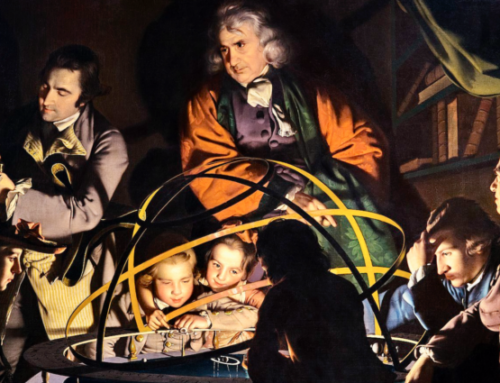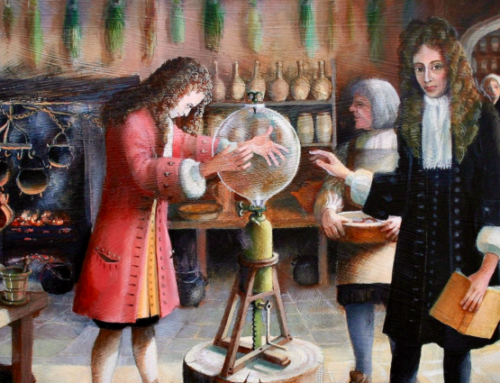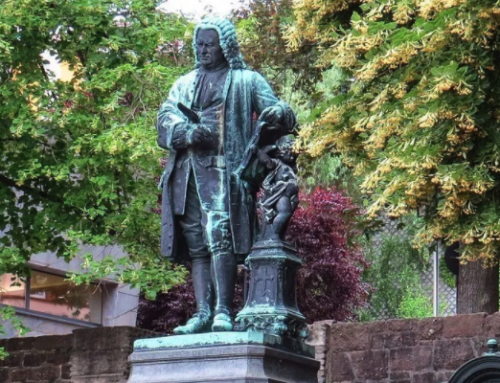 Much has been written about Pope Francis’ encyclical Laudato Si’. On the American Right, there has been much hand-wringing over his handling of climate change, whereas the American Left has been praising it for the same reason. The Right’s opposition is largely rooted in a combination of economic arguments and suspicion of the science supporting the existence of—and the causal chain for—anthropocentric climate change. And these arguments are somewhat compelling: they at least act as a critique of those who view knowledge solely in terms of a reductive scientism, who have made this issue a litmus test for orthodoxy, and who therefore view technocracy (that is, technology plus an oligarchy of “experts”) as the solution to all political, social, and natural ills. Still, it is imprudent to outright deny the testimony of large numbers of those who study these things professionally.
Much has been written about Pope Francis’ encyclical Laudato Si’. On the American Right, there has been much hand-wringing over his handling of climate change, whereas the American Left has been praising it for the same reason. The Right’s opposition is largely rooted in a combination of economic arguments and suspicion of the science supporting the existence of—and the causal chain for—anthropocentric climate change. And these arguments are somewhat compelling: they at least act as a critique of those who view knowledge solely in terms of a reductive scientism, who have made this issue a litmus test for orthodoxy, and who therefore view technocracy (that is, technology plus an oligarchy of “experts”) as the solution to all political, social, and natural ills. Still, it is imprudent to outright deny the testimony of large numbers of those who study these things professionally.
 That said, the question regarding what is happening, and the question regarding what should be done about it are distinct. The former is question appropriately one of science. The latter, however, is one of moral philosophy. More specifically, it is a prudential question requiring the application of wisdom. In Laudato Si, Pope Francis accepts the former question as given (this is, by the way, what has earned him praise from the American Left). Whether or not he is right to do so is a matter that may be—and has been—debated. But the thrust of the encyclical lies in the latter question, and it is on this question that it serves as a critique of the technocratic scientism that lies at the heart of nearly all political discourse in the United States, Left and Right, and as a call for a recovery of wisdom.
That said, the question regarding what is happening, and the question regarding what should be done about it are distinct. The former is question appropriately one of science. The latter, however, is one of moral philosophy. More specifically, it is a prudential question requiring the application of wisdom. In Laudato Si, Pope Francis accepts the former question as given (this is, by the way, what has earned him praise from the American Left). Whether or not he is right to do so is a matter that may be—and has been—debated. But the thrust of the encyclical lies in the latter question, and it is on this question that it serves as a critique of the technocratic scientism that lies at the heart of nearly all political discourse in the United States, Left and Right, and as a call for a recovery of wisdom.
Drawing on St. Francis of Assisi (from whom, of course, he takes his Papal name), Pope Francis says “an integral ecology calls for openness to categories which transcend the language of mathematics and biology, and take us to the heart of what it is to be human” (Laudato Si’, 11). This represents an outlook radically at odds with the materialistic technocracy of the Left and the materialistic market reductionism of much of the Right–one that represents a concern for a full human flourishing, concerned with the common good and the integral relationship between the physical body and the spirit.
On the specific point of climate change, Francis acknowledges that there are differences of opinion, and he calls for “a new dialogue about how we are shaping the future of our planet. We need a conversation which includes everyone, since the environmental challenge we are undergoing, and its human roots, concern and affect us all” (14). Such a call effectively constitutes an urging to return to politics—understood in the classical sense of deliberation about the common good—as a means to grapple with human issues. This stands in contrast to the effective elimination of political space that technocracy of all stripes represents. This is the uniquely human way of dealing with moral and political issues (that is, those issues proper to the polis as Aristotle reminds us—those proper to the zoon politikon or “political animal”).
Rightly understood, Pope Francis tells us that he intends to use the issue of climate change and our care of the planet only as a means to ground theological and philosophical reflection: “Theological and philosophical reflections on the situation of humanity and the world can sound tiresome and abstract, unless they are grounded in a fresh analysis of our present situation, which is in many ways unprecedented in the history of humanity. So, before considering how faith brings new incentives and requirements with regard to the world of which we are a part, I will briefly turn to what is happening to our common home” (17). In other words, the discussion of the specific issue of climate change in the encyclical is a way to ground a much broader examination of the human condition with regard to how we relate to God, nature, and each other.
From climate change, he quickly moves to criticism of many features from modern life, from cityscapes that surround us with “cement, asphalt, glass and metal… depriv[ing us] of physical contact with nature” (44) to a “media and the digital world [that have] become omnipresent” causing people to stop “learning how to live wisely, to think deeply and to love generously” which may lead to “the great sages of the past run the risk of going unheard amid the noise and distractions of an information overload” (47). He calls for a renewed search for “true wisdom, as the fruit of self-examination, dialogue and generous encounter between persons” not “mere accumulation of data which eventually leads to overload and confusion, a sort of mental pollution” (47). In other words, contrary to the ideology of scientism—which holds that discreet chunks of empirical data are all that can be meaningfully said to be known—Pope Francis seeks to revitalize an older tradition of seeking wisdom—a tradition that looks remarkably similar to the methodology and ends of liberal learning.
He goes on to point out a paradox of social media and internet communication:
Real relationships with others, with all the challenges they entail, now tend to be replaced by a type of internet communication which enables us to choose or eliminate relationships at whim, thus giving rise to a new type of contrived emotion which has more to do with devices and displays than with other people and with nature. Today’s media do enable us to communicate and to share our knowledge and affections. Yet at times they also shield us from direct contact with the pain, the fears and the joys of others and the complexity of their personal experiences (47).
Real, lived relationships are demanding. They are not infinitely malleable, and they are at times inconvenient. This position stands in stark contrast to the modern individualism that is presupposed in much of Western political discourse (and is a position that has much in common with the political philosophy of Edmund Burke): We do not always get to choose our relationships, and the fact that they are unchosen does not lessen their moral weight. Pope Francis here points out that social media allows us to construct personas, and to eliminate those who are inconvenient at will. But paradoxically, it is the very complexity of real, often unchosen and inconvenient relationships that is fulfilling and contributes to human flourishing.
This complexity—and the give-and-take attendant to it—is precisely what comprises the dialogue that is the crux of liberal learning, and is precisely what makes it so edifying. When we come into contact with persons who challenge us and encounter ideas that cause us to question our assumptions, we grow, we flourish—and, in time, we obtain wisdom.
Our time is one of incredible technological advances, and, Pope Francis is careful to say, those advances have done much to further human well-being. However, technological advances should not be conflated with moral progress or the possession of wisdom. Indeed, he says, “[n]ever has humanity had such power over itself, yet nothing ensures that it will be used wisely, particularly when we consider how it is currently being used” (104). Nothing, that is, except a properly developed sense of wisdom that comes with liberal learning.
This amounts to a criticism of the project of another Francis: English philosopher Francis Bacon, for whom man “understands only as much as he has observed of the order of nature in fact or inference”[i] and for whom knowledge and power “come to the same thing”[ii]. On the contrary, says Pope Francis, “there is a tendency to believe that every increase in power means ‘an increase of “progress” itself.” But, quoting Romano Guardini’s’ The End of The Modern World: A Search for Orientation, he states, “The fact is that ‘contemporary man has not been trained to use power well’, because our immense technological development has not been accompanied by a development in human responsibility, values and conscience” (105). An increase in power is not to be simply equated with progress; rather, power without wisdom actively threatens genuine progress. The knowledge and practice of morality is inextricably bound up with the acquisition of wisdom, from which flows virtuous action and right application of power.
Drawing further on Guardini’s analysis, Pope Francis launches into an assault on the (Baconian) “technocratic paradigm” that has overtaken the world:
This paradigm exalts the concept of a subject who, using logical and rational procedures, progressively approaches and gains control over an external object. This subject makes every effort to establish the scientific and experimental method, which in itself is already a technique of possession, mastery and transformation. It is as if the subject were to find itself in the presence of something formless, completely open to manipulation (106).
The Baconian method, which is the modern world’s “novum organon” (new tool) for obtaining power over nature, results in this paradigm which draws all things into itself, and which squeezes out the truly political sphere, in which human relationships and dialogue seek wisdom and attempt to answer the question of how we should live. This results in situation wherein “our capacity to make decisions, a more genuine freedom and the space for each one’s alternative creativity are diminished” (108).
 The technocratic paradigm results in a splintering of knowledge through the radical specialization of disciplines. Pope Francis recognizes that “fragmentation of knowledge proves helpful for concrete applications”. (110) Indeed, it is just this specialization which has resulted in the amazing technological advances that have come to define the modern world. However, he quickly follows by noting that “it often leads to a loss of appreciation for the whole, for the relationships between things, and for the broader horizon, which then becomes irrelevant” (110).
The technocratic paradigm results in a splintering of knowledge through the radical specialization of disciplines. Pope Francis recognizes that “fragmentation of knowledge proves helpful for concrete applications”. (110) Indeed, it is just this specialization which has resulted in the amazing technological advances that have come to define the modern world. However, he quickly follows by noting that “it often leads to a loss of appreciation for the whole, for the relationships between things, and for the broader horizon, which then becomes irrelevant” (110).
Liberal learning defies this very paradigm. By striving for an integrated understanding of human knowledge, and engaging with other persons (both the authors of great books, as well as one’s instructors and peers), liberal learning promotes broad inquiry into what it means to be human, and how we relate to God, to nature, and to each other. This is not to say that specialization is to be avoided at all costs, of course. The sheer scope of human knowledge demands it, to some extent. That said, meaning is not exhausted by scientific descriptions—in fact, scientific descriptions themselves are only ultimately meaningful when viewed as a piece of the broader scope of human knowledge—those things which ultimately make life itself meaningful and provide the means to obtain human flourishing in its fullest sense. And human flourishing is impossible without the wisdom to understand our proper relationship to God, nature, and each other.
In this sense, Laudato Si’ represents a call to return to true liberal learning, that learning which prepares free moral agents to understand the cosmos, and ourselves, in a way that enables true liberty and true flourishing.
Books on the topic of this essay may be found in The Imaginative Conservative Bookstore.
Notes:
[i] Novum Organon, Part I, Aphorism I.
[ii] Novum Organon, Part I, Aphorism III.







>>”an integral ecology calls for openness to categories which transcend the language of mathematics and biology, and take us to the heart of what it is to be human” (Laudato Si’, 11). This represents an outlook radically at odds with the materialistic technocracy of the Left and the materialistic market reductionism of much of the Right–one that represents a concern for a full human flourishing, concerned with the common good and the integral relationship between the physical body and the spirit.”<<
Indeed, the two standard political poles keep failing us… I wish to thank this author for the summary of Laudato Si. The Pope's master work creates a giant philosophical umbrella, in order to help everyone to understand, including atheists, not only climate change but other environmental and human calamities. The problems with our hyper-rational order are starkly evident, and its violence against nature is only the by-product of our absenteeism in simple human endeavors e.g. faith, family, community, and life.
One point of disagreement with this article — it is imprudent to ignore the opinions of so many who study climate change professionally… There are two thing wrong with this statement. First, there are many people who know a few things about climate science, statistics, and many other related topics, who completely disagree with the causal chain. The way you’ve phrased it sounds like, “there is consensus, and a few people object.” The reality is just about the opposite — there is no consensus except in the major newspapers and a few select “science journals.” The second problem is the reality that if there were no “climate change,” there would be no funds for people to study it full time — the tune of $1.5 trillion according to a recent study. The last thing you would ever hear a cancer specialist say is, “there is no more cancer,” because he would be putting himself out of a job. You need to pay as much attention to the arguments of those who do not study the climate for a living as you do of those who do.
Consensus has nothing to do with this. The arguments need to be assessed, not the consensus.
Russ,
Thank you for your thoughtful reply.
Full disclosure: I lean toward the “climate skeptic” side of things personally. However, I wanted to give due deference to those who do study these things professionally. What I meant with that statement is simply to say that all sides need to be taken into consideration — the out-of-hand dismissal of those who are experts in the field who sincerely believe that global warming (or “climate change”) is occurring by some on the American right is problematic, I think. I also intentionally avoided the word “consensus” for the precise reason you point out.
At any rate, my overall point was to try and show that in the context of the encyclical, the issue of climate change is really almost a side issue: it is a way to ground a deeper theological and philosophical reflection on the meaning of Creation and our relationship to it. Francis gives an inch to the technocratic paradigm by granting the truth of climate change, and then takes a mile by critiquing the entire enterprise as a wrong-headed and narrow way of understanding ourselves and Creation.
It is fine to praise the pope’s praise of “liberal learning” and his advocacy of the “whole person.” It is good to attempt to transcend “left” and “right” and to cavil against scientism and the “materialistic” marketplace. The issue that needs engagement, and which it seems Catholic and, more generally, Christian thinking has failed, is how to provide sufficient energy to support a population of around seven billion people. Using streams and dead twigs and branches and basking in the sunshine is not enough. Science and technology has put coal, petroleum, natural gas — and now sun and wind, with impressive contributions from science and technology — to improve human well being and even to make the existence of billions of people possible.
Markets have proven a very durable way to distribute a vast array of goods and services. It is not perfect. Nor should everything imaginable be distributed through anything that approximates a “free market.” But it has proven durable because, except in small communities with exceptional people, (think families, monasteries, nunneries) other systems — often found on “reason” and “science” and more propounded based on hubris — continue to fail to do as well as some form of the “market” has. Even with its imperfections.
So these seem false dichotomies to present, which then the papal encyclical transcends.
To be “pro life” means, among other things, to be able to provide for the basic existence of humans on this earth. Science and technology have discovered new and vastly important ways to harness nature so as to make energy far more accessible than it was previously. What are the alternatives? Not “liberal learning” — even though I’m very much in favor of it. (Our older son went to St. John’s College.) The market incentives for the discovery of the energy sources we now use — and most of those we may well hope and pray to use in the future — will remain important (if not sufficient) — as well as for its distribution
As a more “traditionalist” than “libertarian” leaning Conservative, I have an inherent mistrust of the unfettered Free Market. (Which you did not advocate, to be sure.)
A totally Laissez-faire market will lead, inevitably due to human sinfulness, to the pre-teen prostitute and the seven year old crack addict, and the harvesting of baby parts for resale will be seen as merely “good business”.
Without morality, without the ethics which derive from the Western Civilization, and particularly from Christianity, such things will happen. Similar things have happened even with the influence of Christianity and Western Culture.
Regrettably, I cannot see the Corporation, which is as soulless an entity as any golem, practicing moral discipline. Which requires (and I am pained to say it) the intervention of the State, acting as the body which the populace has appointed to do for the overall society what individuals and small associations cannot.
Moreover, I am becoming dubious as to the workability of small (as opposed to Constitutionally limited) governments in the age of population intensity and global technocratic enterprises.
It is a discussion which is by no means settled, whether the “science” is or not. The exchange of ideas/facts/philosophies in this area is essential to finding solutions. Which is one reason I value remarks such as the authors, and yours.
I am waiting for the howl when the Left realizes that a “throwaway culture” includes abortion, euthanasia, fetal parts harvesting, and (by implication) SSM.
They will stop posting “memes” of ripped quotes, and begin calling for his head. (Or impeachment — they really do believe everything is political.)
Hah!.. Yes, hasn’t Francis been very tactful? US Catholics are mostly upset that he did not fervidly wag his finger at population regulators but instead brought them around for consultation.
His moment for clarification (and we would pray reflection rather than reaction by many on the left), might come during his brief visit to the US next month. Will he simply again call for ameliorating capitalism like a broken record and further offending US traditionalists who were anxiously tuned into his Bolivian visit? Or will he start to connect the dots from the mega-economy over to life and women’s rights (to motherhood, that is), and take our social engineers to reflection or, as you predict, reaction? We shall see…